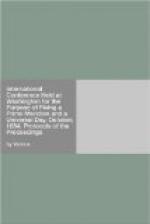Mr. LEFAIVRE, Delegate of France, stated that he agreed with what had been said by the President, that the Conference should have Secretaries who were specialists, and that the proceedings should be recorded in two languages. By adjourning till to-morrow he thought that the delegates would have an opportunity to reflect upon the subject, and to come back prepared to vote upon it.
The PRESIDENT then stated that if any delegates wished to make propositions in regard to the proceedings to-morrow it would be in the power of the Conference to proceed to the consideration of those subjects after the election of the Secretaries, and he suggested to the Delegate of Venezuela (Mr. Soteldo) that the motion to adjourn be withdrawn for the present.
The Delegate of Venezuela thereupon withdrew his motion.
Mr. FREY, Delegate of Switzerland, said that, in his opinion, the order of proceedings to-morrow should be first a general discussion.
Mr. VALERA, Delegate of Spain, stated that he thought the proceedings should be recorded in two languages at least, and that Secretaries conversant with these languages and specially acquainted with the subject matter pending before the Conference should be selected; that, in order to have the record of the proceedings accurate, officers qualified in this way were requisite, and that it would be preferable to elect these officers after consultation among the members of the Conference, which could be had between now and the meeting to-morrow.
Count LEWENHAUPT, Delegate of Sweden, said that he saw no difficulty in deciding now that the order of proceedings to-morrow would be first the election of the Secretaries and then a general discussion, and he moved that this proposition be adopted.
The Conference then unanimously agreed to the proposition.
Professor ABBE, Delegate of the United States, inquired whether it would not facilitate the action of the Conference to-morrow if the President appointed a committee now who could nominate the Secretaries.
The PRESIDENT replied by asking whether it would not be better to select this committee at a subsequent meeting, rather than at the first meeting, which was held to-day.
Commander SAMPSON, Delegate of the United States, then gave notice that at the session to-morrow he would bring before the Conference the question whether the meetings shall be open to the public or not, and that he would, at the proper time, also make a motion for the purpose of determining the sense of the Conference as to the propriety of inviting distinguished scientists, some of whom are now in Washington, and who may desire to be present at the meetings of this Conference, to take part in the discussion of the questions pending.
Mr. LEFAIVRE, Delegate of France, stated that in regard to the first proposition—that is, as to making the proceedings public, he would object, inasmuch as he thought that by opening the doors of this Conference to the public nothing could be gained, while the proceedings might be embarrassed or delayed by such a course.




